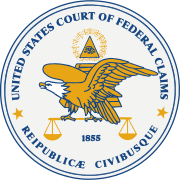| G. L. Christian and Associates v. United States | |
|---|---|
 Seal of the United States Court of Federal Claims | |
| Court | United States Court of Claims |
| Full case name | G. L. Christian and Associates v. United States |
| Decided | January 11, 1963 |
| Court membership | |
| Judges sitting | John Marvin Jones, Oscar Hirsh Davis, James Randall Durfee, Don Nelson Laramore, and Samuel Estill Whitaker |
| Chief judge | John Marvin Jones |
| Case opinions | |
| Decision by | Oscar Hirsh Davis |
| Concurrence | John Marvin Jones, James Randall Durfee, Don Nelson Laramore, and Samuel Estill Whitaker |
G.L. Christian and Associates v. United States (312 F.2d 418 (Ct. Cl. 1963), cert. denied, 375 U.S. 954, 84 S.Ct. 444) is a 1963 United States Federal Acquisition Regulation (FAR) court case which has become known as the Christian Doctrine. The case held that standard clauses established by regulations may be considered as being in every Federal contract. Because the FAR is the law, and government contractors are presumed to be familiar with the FAR, a mandatory clause that expresses a significant or deeply ingrained strand of public procurement policy will be incorporated into a Government contract by operation of law, even if the parties intentionally omitted it.[1][2]
- ^ Sisk, Gregory C.; Urban A. Lester (2006). Litigation with the federal government (4 ed.). Ali-Aba. p. 321. ISBN 978-0-8318-0865-5.
- ^ O'Brien, Karen (2007). The Government Contracts Reference Book. CCH Incorporated. pp. 94, 521. ISBN 978-0-8080-1739-4. "If a mandatory clause that implements fundamental procurement policy is omitted from the contract without a deviation, it is included in the contract by operation of the Christian Doctrine" "...legal rule providing that clauses required by regulation to be included in government contracts will be read into the contract whether or not physically included in the contract, unless a proper deviation from the regulation has been obtained...The Christian Doctrine should not...be read to mean all procurement regulations have the force and effect of law, it applies only to those regulations that impact a fundamental procurement policy.